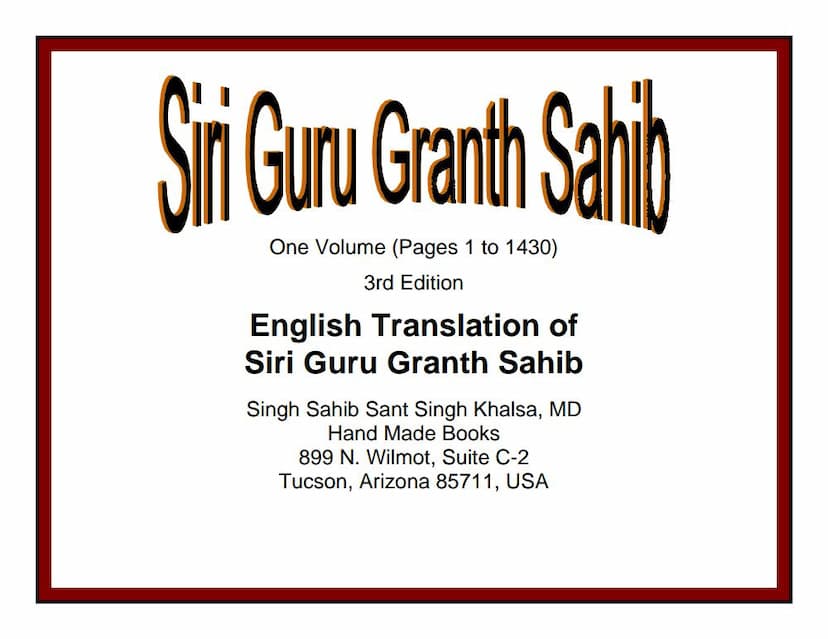Guru Granth Sahib
Added to library: September 1, 2025

Summary
The provided text is a translation of the Siri Guru Granth Sahib, the holy scripture of Sikhism, rendered into English by Singh Sahib Sant Singh Khalsa. Despite the text being presented under a Jain catalog link and mentioning Jain education, the title and content clearly identify it as the Sikh scripture. The translation aims for a comprehensive rendering of the original text.
The Siri Guru Granth Sahib is presented as a single volume, running from pages 1 to 1430, with this being the 3rd edition of the English translation.
Key Themes and Concepts Explored in the Text:
The translated sections primarily focus on the following profound theological and philosophical concepts:
- The Universal Creator God: The text begins with a powerful invocation of the One Universal Creator, emphasizing His absolute oneness, fearlessness, hatredlessness, and existence beyond birth and death. His Name is equated with Truth, and He is described as the source of all creation and existence.
- Hukam (Divine Command/Will): A central theme is the understanding and acceptance of God's Hukam. Everything that happens, from the creation of bodies and souls to the distribution of pain and pleasure, high and low status, is governed by His Command. One who understands this Command does not speak in ego.
- The Incomprehensibility of God: The text repeatedly stresses that God cannot be fully understood or described through thought, cleverness, or philosophical studies. Even the greatest beings and scriptures cannot fully capture His essence.
- The Importance of the Name (Naam): Chanting and meditating on the True Name is presented as the ultimate path to truthfulness, liberation, and peace. It is the means to overcome illusion, cleanse the intellect, and attain spiritual wisdom.
- The Guru's Role: The Guru is portrayed as the divine guide, the source of wisdom, the ferry across the world-ocean, and the one who imparts the understanding of God's Will and the Naam. The Guru's Word (Shabad) is considered all-pervading, and the Guru himself is identified with the divine principles of Shiva, Vishnu, and Brahma.
- The Nature of the Faithful (Sikhs): The faithful are described as those who possess intuitive awareness, know about all realms, are never struck by misfortune, do not have to face the Messenger of Death, and find the Door of Liberation. They uplift their families and are carried across with the Guru.
- The Power of Listening and Contemplation: The text emphasizes the transformative power of listening to and contemplating the Guru's Word, which leads to the erasure of pain and sin, honor, intuitive understanding, and bliss.
- Rejection of Ritualism and Ego: The text criticizes reliance on mere outward rituals, empty religious practices, pride, and ego. It stresses that pleasing God and acting according to His Will are paramount.
- The Value of Virtue and Truth: Good deeds, truthfulness, contentment, and wisdom are highlighted as essential for spiritual progress and pleasing the Divine.
- The Nature of Maya (Illusion): Worldly attractions, possessions, youth, and superficial accomplishments are repeatedly described as fleeting and deceptive, ultimately leading to regret.
- The Divine Play of Creation: The text acknowledges the vastness and complexity of God's creation, with countless worlds, species, and manifestations, all orchestrated by His Command.
- Spiritual Transformation: The journey towards God is depicted as a process of overcoming ego, desire, and doubt, and embracing humility, virtue, and unwavering faith in the Guru and the Lord.
Specific Sections and Their Content:
The text includes various sections, identified by "RAAG" (musical mode) and "MEHL" (master, e.g., First Mehl refers to Guru Nanak, Second Mehl to Guru Angad, etc.), followed by specific compositions like "SO DAR" (That Door), "SO PURAKH" (That Primal Being), and "SOHILAA" (The Song of Praise). The excerpt showcases a rich tapestry of devotional poetry, philosophical inquiry, and ethical guidance, all centered on the remembrance of God and the pursuit of truth.
Overall Tone and Message:
The overall tone is devotional, reverent, and instructive. The message consistently points towards the omnipresence and omnipotence of the Creator God, the need for surrender to His Will, the importance of the Guru's guidance, and the liberating power of meditating on the Divine Name. It encourages a life of virtue, humility, contentment, and selfless service. The translation aims to convey these profound spiritual truths in accessible English.
Note on the Jain Connection:
While the catalog link might suggest a Jain connection, the content of the provided text is unequivocally the Siri Guru Granth Sahib, the central religious text of Sikhism. There are no discernible elements of Jain philosophy or scripture within the excerpt. The "JAIN EDUCATION INTERNATIONAL" mention appears to be an error or mislabeling in the provided context.